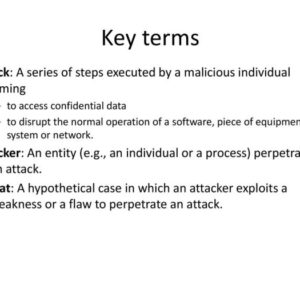FTC slams GoDaddy security practices – the headline alone screams drama, right? This isn’t your average tech-news blip; we’re talking about a major domain registrar facing serious accusations of lax security, leaving millions of customers potentially vulnerable. The Federal Trade Commission (FTC) isn’t messing around, and the fallout could reshape the entire domain registration landscape. We’re diving deep into the details, exploring the FTC’s specific complaints, GoDaddy’s response, and what this all means for you.
The FTC’s accusations are serious, painting a picture of inadequate security measures that allegedly allowed customer data to be exposed. GoDaddy, a giant in the industry, is now under intense scrutiny, facing potential fines and reputational damage. This isn’t just about technical glitches; it’s about trust, consumer protection, and the fundamental security of personal information in the digital age. We’ll break down the specifics of the case, analyze the potential impact on GoDaddy customers, and explore the broader implications for the entire domain registration industry.
FTC’s Accusations Against GoDaddy

Source: propelex.com
The Federal Trade Commission (FTC) leveled serious accusations against GoDaddy, a prominent domain registrar and web hosting provider, alleging significant failures in their data security practices. These accusations, resulting in a substantial settlement, highlight the critical importance of robust cybersecurity measures for companies handling sensitive customer information. The FTC’s actions underscore the legal ramifications of neglecting data protection and the potential consequences for businesses that fail to meet industry standards.
Specific Security Practices Criticized by the FTC
The FTC’s complaint detailed several areas where GoDaddy’s security practices fell short. These included inadequate security measures to protect customer data, insufficient response to known vulnerabilities, and a lack of comprehensive security training for employees. The FTC argued that these shortcomings left customer data vulnerable to unauthorized access and breaches. Specifically, the FTC criticized GoDaddy’s failure to implement multi-factor authentication (MFA) by default, a widely accepted best practice for enhancing account security. They also pointed to vulnerabilities in GoDaddy’s systems that allowed unauthorized access to customer data, including personal information and financial details.
Legal Basis for the FTC’s Action
The FTC’s action against GoDaddy was based on several federal laws, primarily the Federal Trade Commission Act (FTCA). The FTCA empowers the FTC to take action against unfair or deceptive trade practices, including those that involve the failure to protect consumer data. The FTC argued that GoDaddy’s inadequate security practices constituted an unfair trade practice, as they violated consumers’ reasonable expectations of data security and exposed them to significant risks. The case highlights the FTC’s increasing focus on holding companies accountable for data breaches and security failures.
Examples of GoDaddy’s Alleged Failures in Protecting Customer Data
The FTC’s complaint cited specific instances where GoDaddy’s security failures led to data breaches or vulnerabilities. One example highlighted GoDaddy’s failure to promptly address known vulnerabilities in their systems, allowing attackers to potentially gain unauthorized access to customer accounts. Another example involved insufficient employee training, which contributed to security lapses. These failures, according to the FTC, resulted in the exposure of sensitive customer data, including usernames, passwords, and financial information, potentially leading to identity theft and financial losses for customers.
Comparison of GoDaddy’s Security Practices to Industry Best Practices
The FTC’s action underscored the significant gap between GoDaddy’s security practices and industry best practices. Industry standards emphasize the importance of multi-factor authentication, robust security monitoring, regular security assessments, and comprehensive employee training. GoDaddy’s alleged failures in these areas placed them far behind industry leaders in data security. The settlement serves as a stark reminder to other companies to prioritize robust security measures and regularly assess their compliance with industry best practices.
Summary of Key Accusations and Their Alleged Impact
| Accusation | Alleged Impact |
|---|---|
| Failure to implement multi-factor authentication (MFA) by default | Increased vulnerability to unauthorized account access and data breaches. |
| Insufficient response to known vulnerabilities | Prolonged exposure of customer data to potential attackers. |
| Lack of comprehensive security training for employees | Increased risk of human error leading to security breaches. |
| Inadequate security measures to protect customer data | Exposure of sensitive customer information, potentially leading to identity theft and financial losses. |
GoDaddy’s Response to the FTC
GoDaddy, facing serious accusations from the Federal Trade Commission (FTC) regarding its security practices, didn’t simply accept the charges. Their response was a multi-pronged defense strategy aimed at mitigating the damage and demonstrating a commitment to improvement. This involved a detailed rebuttal of the FTC’s claims, outlining their own security measures, and proposing concrete changes to their operations.
GoDaddy’s Key Arguments and Proposed Remedies
GoDaddy’s official response to the FTC centered on several key arguments. They disputed the severity of the alleged vulnerabilities, highlighting the steps they had already taken to address security concerns. They emphasized their investment in security infrastructure and personnel, arguing that the FTC’s accusations didn’t accurately reflect the overall effectiveness of their security program. Crucially, GoDaddy didn’t deny all wrongdoing; instead, they presented a narrative of continuous improvement, acknowledging areas where enhancements were needed while simultaneously contesting the FTC’s characterization of their shortcomings. Their proposed remedies included significant investments in additional security measures, enhanced employee training programs, and a strengthened customer notification system. These were presented not as admissions of guilt, but as proactive steps to further fortify their security posture.
Financial Implications for GoDaddy
The FTC’s action carries substantial financial implications for GoDaddy. The settlement, if reached, would likely involve significant financial penalties. Beyond the direct financial penalties, there’s also the potential for reputational damage, leading to customer churn and a decline in new business. This could affect their stock price and overall market valuation. The costs associated with implementing the proposed security enhancements further add to the financial burden. For example, a similar case against a major company could involve millions of dollars in fines and remediation costs, impacting profitability and investor confidence. The precise financial impact will depend on the terms of any final settlement or court decision.
Timeline of Events
The timeline of events begins with the FTC’s initial investigation, which likely involved a period of data gathering and analysis. Following this, the FTC issued its formal accusations, outlining specific security failures and alleging violations of consumer protection laws. GoDaddy then formulated its response, which included a detailed rebuttal of the accusations and a proposal for remedial actions. Negotiations between GoDaddy and the FTC followed, potentially involving back-and-forth discussions and the submission of additional information. This process could lead to a settlement agreement, a court trial, or other resolution. The exact dates for each stage are not publicly available in many cases, but the overall process can take months, even years, to resolve.
Impact on GoDaddy Customers
The Federal Trade Commission’s accusations against GoDaddy regarding significant security flaws paint a concerning picture for millions of its customers. The alleged breaches, if proven true, could have far-reaching consequences, impacting everything from personal data to business operations. Understanding the potential impact and taking proactive steps to mitigate risks is crucial for anyone using GoDaddy’s services.
The alleged security lapses exposed customer data to potential misuse. This vulnerability could have allowed malicious actors to access sensitive information, leading to various negative outcomes. The scale of the potential damage depends heavily on the specific services a customer used and the type of data they stored with GoDaddy.
Types of Customer Impact
The potential impact varies significantly depending on the specific services a customer utilized. Website owners, for example, might have experienced compromised website content, leading to reputational damage or even financial losses if sensitive customer data was exposed. Email users could have faced phishing attacks or account takeovers, potentially resulting in the theft of personal information or the sending of malicious emails to their contacts. Those using GoDaddy’s domain registration services might have found their domains compromised, leading to redirection to malicious websites or the loss of control over their online presence. The severity of the impact is directly correlated with the type and amount of data compromised. For instance, exposure of payment details poses a much greater risk than the exposure of a simple email address.
Examples of Customer Impacts
Imagine a small business owner using GoDaddy for website hosting and email. A successful breach could lead to the theft of customer credit card information, resulting in significant financial losses and legal liabilities. Alternatively, a blogger using GoDaddy for domain registration and hosting could find their website defaced or used to spread malware, damaging their reputation and potentially impacting their search engine rankings. These are just two examples; the reality could involve a wide range of scenarios, depending on the specifics of the breach and the nature of the customer’s data.
Protecting Your Data After the FTC Announcement
Following the FTC’s announcement, customers should take immediate steps to enhance their data security. This includes reviewing their GoDaddy account security settings, changing passwords, enabling two-factor authentication, and monitoring their financial accounts and credit reports for any suspicious activity. Furthermore, it’s advisable to perform regular backups of important website data and consider using alternative security solutions, such as robust anti-virus software and a VPN, to protect against further threats. Staying informed about any further updates or advisories from GoDaddy and the FTC is also crucial.
Risk Levels for Different Customer Types
Website owners who store sensitive customer data (e.g., credit card information, personal details) face a higher level of risk than those who only use GoDaddy for domain registration. Similarly, email users who store important personal information within their GoDaddy email accounts are at a greater risk than those who primarily use the service for less sensitive communications. The risk level is directly proportional to the sensitivity of the data stored and the extent of the customer’s reliance on GoDaddy’s services.
Customer Action Checklist
To mitigate potential risks, customers should follow this checklist:
- Change all GoDaddy passwords immediately.
- Enable two-factor authentication on all GoDaddy accounts.
- Review account activity for any suspicious logins or transactions.
- Monitor credit reports and bank statements for unauthorized activity.
- Back up all important website data regularly.
- Install and maintain robust anti-virus and anti-malware software.
- Consider using a VPN for enhanced online security.
- Report any suspicious activity to GoDaddy and the relevant authorities.
Broader Implications for the Domain Registration Industry

Source: covingtoncreations.net
The FTC’s action against GoDaddy sends shockwaves through the domain registration industry, highlighting critical vulnerabilities in data security practices and potentially reshaping the landscape for years to come. This isn’t just about one company; it’s a wake-up call for the entire sector, forcing a much-needed reassessment of security protocols and consumer trust.
The FTC’s case against GoDaddy underscores the systemic risks inherent in the industry’s current security model. The implications extend beyond GoDaddy, prompting other registrars to examine their own practices and potentially triggering a wave of improvements. This ripple effect could lead to enhanced security measures, increased transparency, and potentially even stricter regulations.
Potential Changes in Security Practices, Ftc slams godaddy security practices
The GoDaddy case is likely to catalyze significant changes in security practices across the domain registration industry. Expect to see a greater emphasis on multi-factor authentication (MFA), improved phishing protection measures, and more robust data encryption protocols. We might also see a shift towards more rigorous employee training programs focusing on cybersecurity awareness and incident response. Companies will likely invest more heavily in security auditing and penetration testing to identify and address vulnerabilities proactively. This proactive approach is a direct response to the vulnerabilities exposed in the GoDaddy case, and represents a significant shift in industry standards.
Influence on Future Regulations Regarding Data Security
This case could significantly influence future regulations regarding data security in the domain registration industry. Governments worldwide are likely to scrutinize the security practices of domain registrars more closely, potentially leading to the introduction of stricter regulations and increased penalties for non-compliance. The FTC’s action sets a precedent, demonstrating a willingness to pursue legal action against companies that fail to adequately protect user data. This could lead to more comprehensive data protection laws, specifically targeting the domain registration sector, mirroring the stringent regulations seen in other data-sensitive industries like finance and healthcare. For example, we might see legislation mandating specific security protocols or requiring regular audits of security practices.
Comparison of GoDaddy’s Security Practices to Other Major Registrars
While the specifics of security practices vary across domain registrars, the GoDaddy case raises questions about the industry’s overall security posture. While some registrars may have already implemented more robust security measures, the incident highlights the potential for similar vulnerabilities to exist elsewhere. A comparative analysis of security practices across major players like Namecheap, Google Domains, and others is crucial to identify best practices and areas needing improvement. This comparative analysis should focus on aspects like MFA implementation rates, incident response protocols, and transparency in security practices. The findings of such an analysis could help establish benchmarks for the industry and inform future regulatory efforts.
Impact on Consumer Trust in Domain Registration Services
The GoDaddy case has undoubtedly eroded consumer trust in domain registration services. Users are now more aware of the potential risks associated with entrusting their domain information to registrars. This decreased trust may lead to users seeking out registrars with demonstrably stronger security reputations, potentially driving a shift in market share towards companies with a proven track record of data protection. The long-term impact will depend on the industry’s response to the FTC’s action and its ability to rebuild consumer confidence through demonstrable improvements in security practices and transparency. This rebuilding of trust will require not only improved security measures but also clear and proactive communication with customers regarding those measures.
Illustrative Example: A Hypothetical GoDaddy Data Breach
Imagine a scenario where a sophisticated cyberattack targets GoDaddy’s systems, exploiting vulnerabilities allegedly highlighted by the FTC. This isn’t a far-fetched fantasy; similar breaches have occurred at other major companies, demonstrating the potential consequences of lax security. This hypothetical breach showcases the severity of the issues at stake.
The Breach Timeline
This section details the chronological progression of a hypothetical data breach stemming from the alleged security flaws at GoDaddy. The timeline illustrates how a seemingly small initial compromise can snowball into a major incident with devastating consequences.
- Initial Compromise: Attackers gain unauthorized access to a GoDaddy server through a vulnerability in their systems, potentially exploiting a known zero-day exploit or a weakness in their outdated software. This initial breach might be facilitated by phishing or exploiting a poorly secured administrative account.
- Lateral Movement: Once inside, attackers use various techniques to move laterally within GoDaddy’s network, gaining access to more sensitive data. This could involve exploiting weak passwords or misconfigured access controls to gain elevated privileges.
- Data Exfiltration: Attackers identify and exfiltrate sensitive customer data. This could involve the use of custom malware to steal data undetected, or simply downloading data to external servers. The exfiltration process could be slow and methodical to avoid detection, or a rapid grab-and-go operation depending on the attacker’s goals and capabilities.
- Data Obfuscation: Before exfiltrating the data, the attackers may encrypt or obfuscate it to make it harder to trace back to them. This step adds another layer of complexity to the investigation and recovery process.
- Covering Tracks: To avoid detection, the attackers may delete logs or modify system files to erase evidence of their intrusion. This further complicates any investigation into the breach and hinders efforts to determine the full extent of the damage.
Consequences for Affected Customers
The hypothetical breach would have severe repercussions for affected GoDaddy customers. The consequences would ripple through their personal and professional lives, leading to significant financial and reputational damage.
- Identity Theft: Compromised personal information, such as names, addresses, email addresses, and phone numbers, could be used for identity theft, leading to fraudulent credit card applications, loan applications, or other financial crimes.
- Financial Loss: Customers could experience significant financial losses due to unauthorized transactions, credit card fraud, or the need to replace compromised identities. The cost of recovery could be substantial, both financially and emotionally.
- Reputational Damage: The breach could severely damage the reputation of affected individuals or businesses, leading to lost trust with customers and partners. This reputational damage could take years to repair.
- Legal Ramifications: Customers may face legal issues, including lawsuits and investigations, related to the breach. They might be forced to spend time and resources on legal battles to resolve the consequences of the data breach.
Types of Compromised Data
The hypothetical breach could expose a wide range of sensitive customer data, depending on the specific systems compromised. The scale of the potential damage is substantial.
- Personally Identifiable Information (PII): Names, addresses, phone numbers, email addresses, dates of birth, social security numbers, driver’s license numbers, and passport information.
- Financial Data: Credit card numbers, bank account details, and other financial information used for domain registration and other services.
- Business Data: For businesses using GoDaddy services, sensitive business information such as client lists, financial records, and intellectual property could be compromised.
- Website Data: Website content, customer databases, and other sensitive information stored on GoDaddy’s servers could be accessed and stolen.
Epilogue: Ftc Slams Godaddy Security Practices

Source: jimcdn.com
The FTC’s action against GoDaddy sends a clear message: data security isn’t optional. For domain registrars, it’s a non-negotiable requirement. The outcome of this case will undoubtedly influence future regulations and industry best practices, potentially forcing a much-needed upgrade in security protocols across the board. For GoDaddy customers, it’s a wake-up call to review their own security measures and to stay vigilant. This isn’t just about GoDaddy; it’s about the future of online security for everyone.


